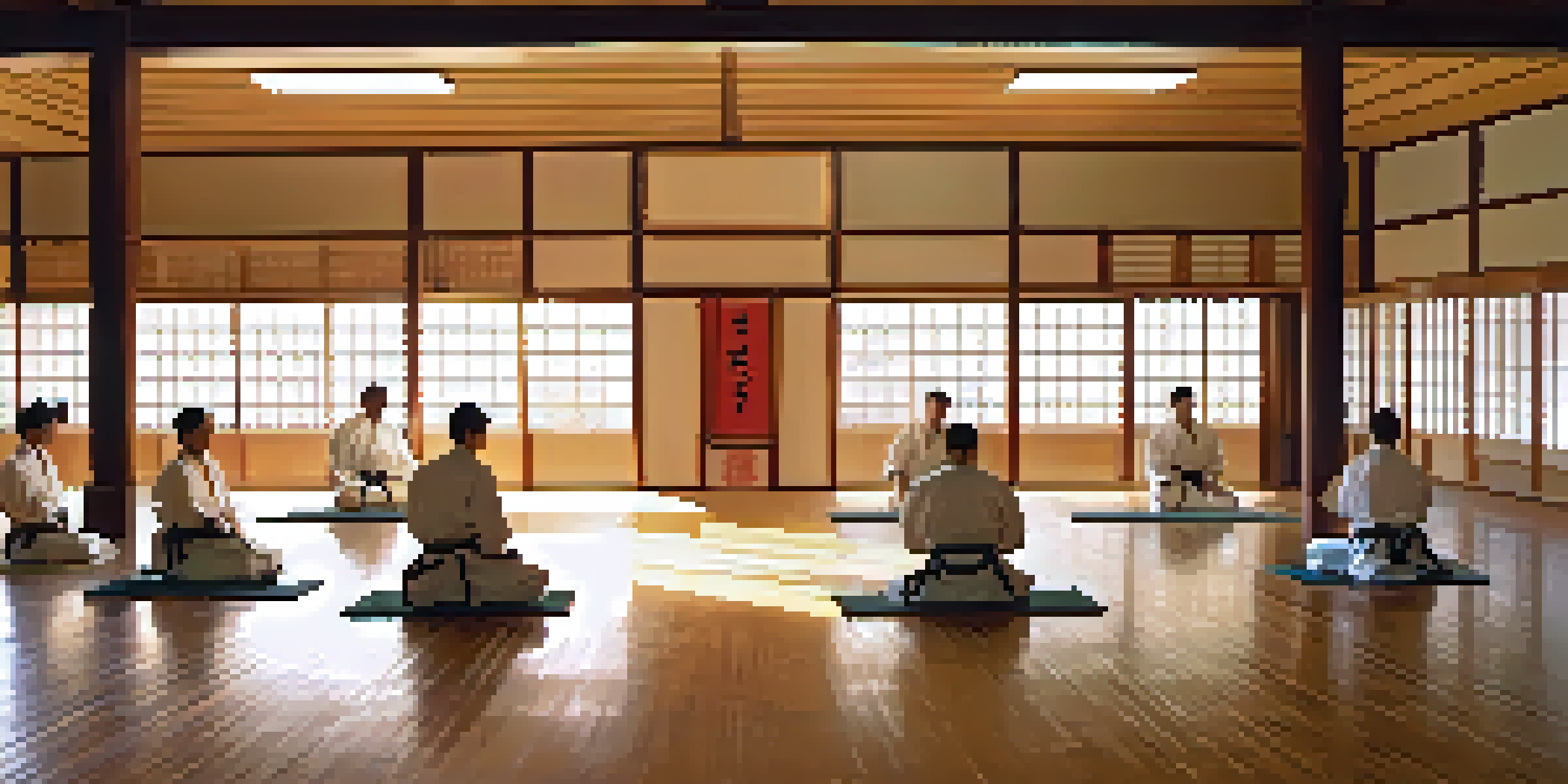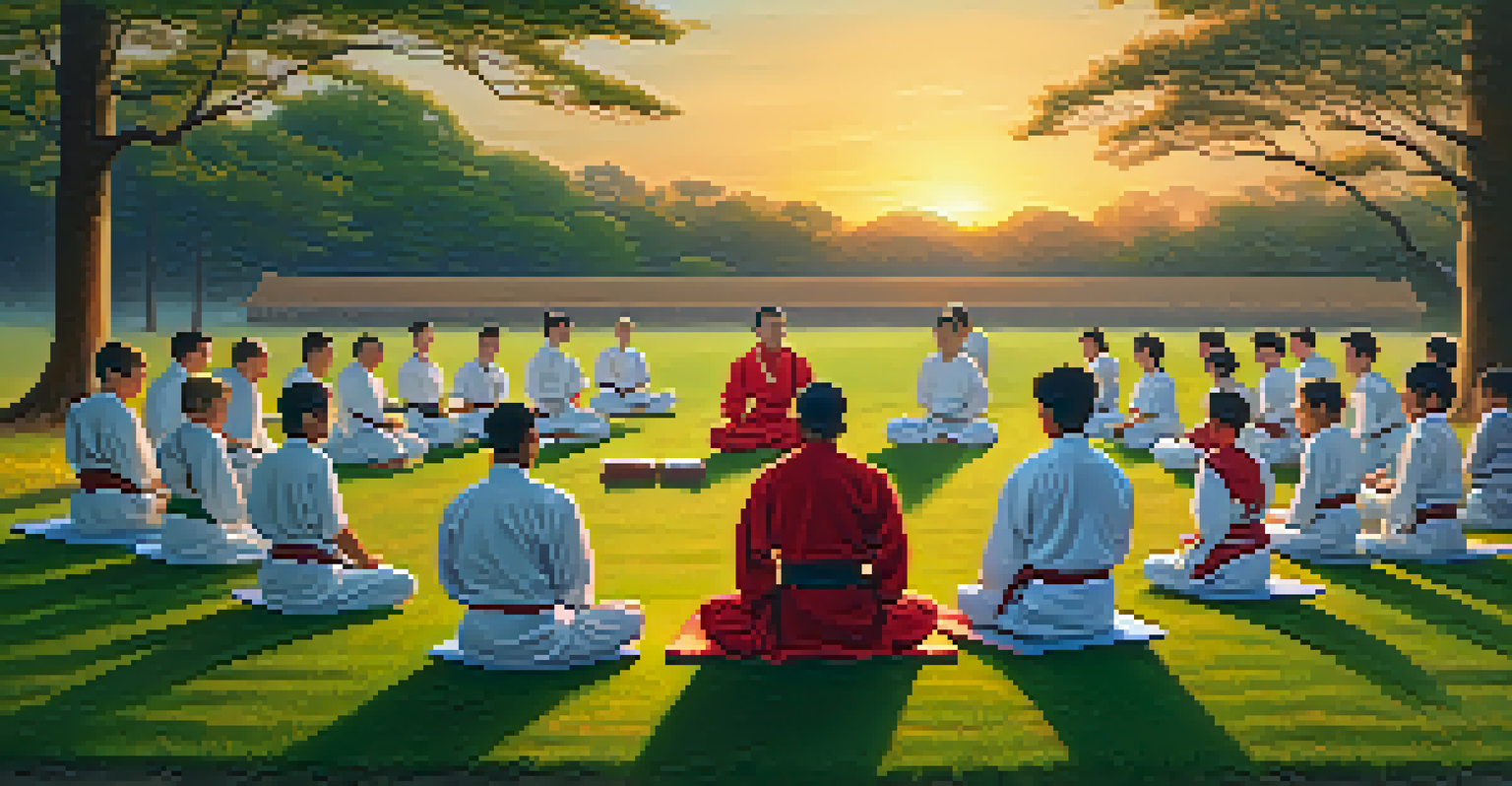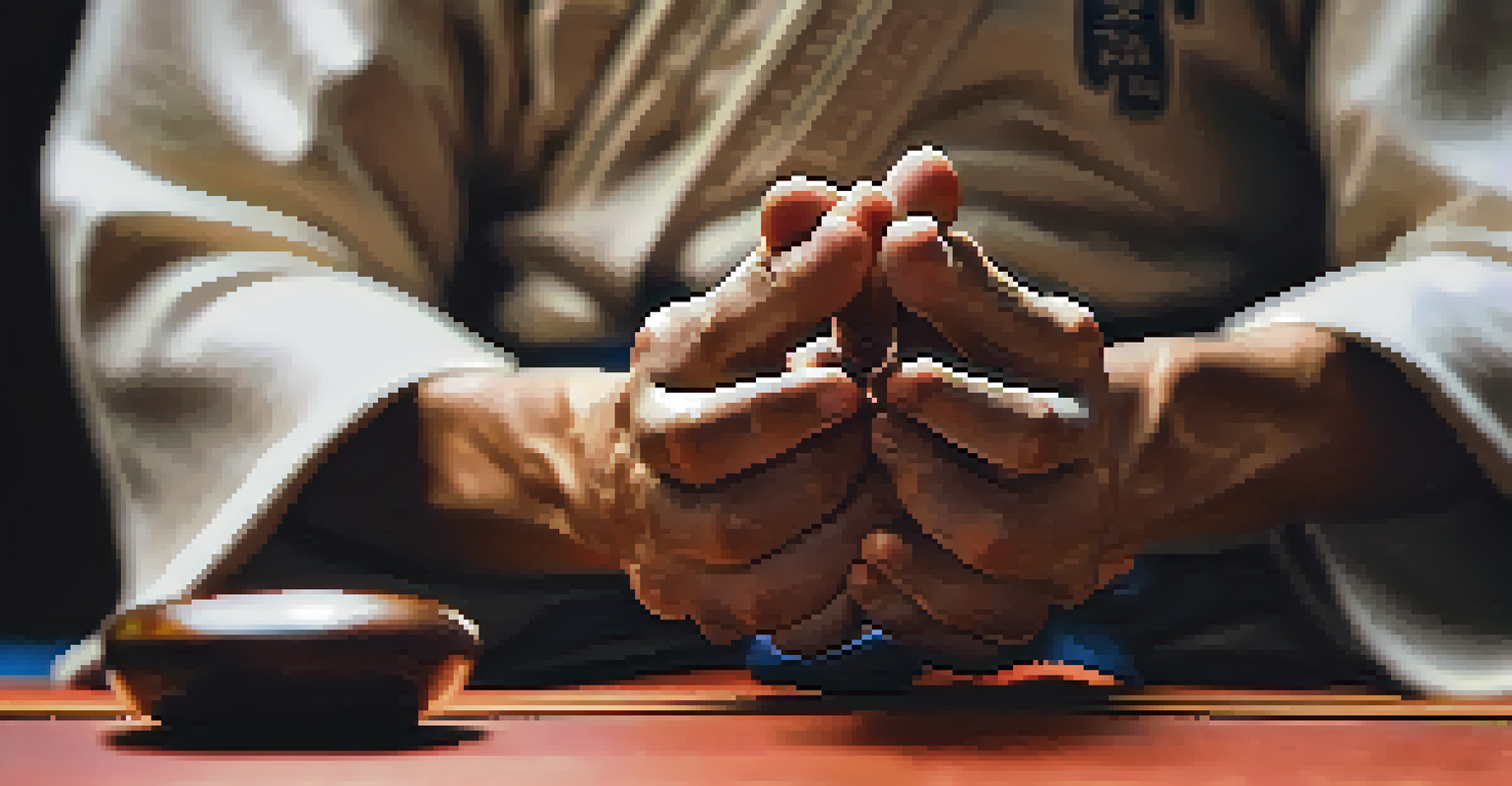The Role of Meditation in Martial Arts for Mental Discipline

Understanding Meditation and Its Importance in Martial Arts
Meditation is a practice that helps individuals focus their minds and achieve a state of calm. In martial arts, it plays a crucial role in enhancing mental clarity and discipline. Practitioners often use meditation to connect their body and mind, which is essential for mastering techniques and movements.
Meditation is not a way of making your mind quiet. It’s a way of entering into the quiet that’s already there – buried under the 50,000 thoughts the average person thinks every day.
The importance of meditation in martial arts cannot be overstated. It allows martial artists to reduce stress and overcome distractions, which can be detrimental in both training and competitions. By fostering a state of inner peace, athletes can tap into their full potential during practice and performance.
Furthermore, meditation cultivates self-awareness, enabling martial artists to recognize their strengths and weaknesses. This self-reflection is invaluable for personal growth and skill development, making meditation an integral part of a martial artist's journey.
How Meditation Enhances Focus and Concentration
One of the primary benefits of meditation is its ability to enhance focus and concentration. In martial arts, where split-second decisions can mean the difference between victory and defeat, maintaining sharp focus is essential. Regular meditation helps practitioners train their minds to stay present and engaged during training and competitions.

For example, a martial artist may practice mindfulness meditation, which encourages them to concentrate on their breath and the sensations in their body. This practice not only calms the mind but also improves their ability to concentrate on their movements and techniques. Over time, this heightened focus translates into better performance on the mat or in the ring.
Meditation Boosts Focus in Training
Regular meditation enhances martial artists' focus and concentration, crucial for success in training and competitions.
Additionally, meditation teaches practitioners to manage distractions effectively. By learning to acknowledge and let go of intrusive thoughts, martial artists can maintain their concentration even in high-pressure situations, allowing them to perform at their best.
Building Emotional Resilience Through Meditation
Emotional resilience is a vital aspect of martial arts, enabling practitioners to remain composed in challenging situations. Meditation fosters this resilience by helping individuals process their emotions and reactions. By regularly engaging in meditation, martial artists can cultivate a balanced emotional state, which is essential for effective training and competition.
In the midst of movement and chaos, keep stillness inside of you.
For instance, a martial artist who experiences anxiety before a fight can use meditation to ground themselves and regain control over their emotions. Through practices like visualization and deep breathing, they train their minds to respond calmly and confidently, rather than reacting impulsively.
Moreover, meditation encourages a growth mindset, allowing martial artists to view setbacks as opportunities for learning rather than failures. This perspective enhances their ability to bounce back from adversity, further strengthening their emotional resilience.
The Connection Between Breath Control and Meditation
Breath control is a fundamental element of both meditation and martial arts. By focusing on their breath, practitioners can regulate their physical and mental states, creating a harmonious balance between body and mind. This connection allows martial artists to execute techniques with precision and fluidity.
Incorporating breath awareness into meditation practice helps martial artists develop greater control over their breath during training. This skill is particularly useful during intense workouts or competitions, where maintaining steady breathing can prevent fatigue and enhance performance.
Emotional Resilience Through Meditation
Meditation helps martial artists cultivate emotional resilience, allowing them to remain composed during challenging situations.
Additionally, controlled breathing can be a powerful tool for managing stress and anxiety. Just as meditation teaches practitioners to breathe mindfully, martial artists can apply these techniques in high-pressure situations, allowing them to remain calm and focused.
Meditation as a Tool for Self-Reflection and Improvement
Self-reflection is a critical aspect of personal growth in martial arts, and meditation serves as an effective tool for this process. Through regular meditation, practitioners can gain insights into their thoughts, emotions, and behaviors, allowing them to identify areas for improvement. This self-awareness is crucial for developing as a martial artist.
For example, a martial artist may meditate to reflect on their performance after a competition. By analyzing their strengths and weaknesses in a calm state, they can develop strategies for improvement, setting specific goals for their training moving forward. This reflective practice fosters continuous growth and evolution.
Moreover, meditation encourages a non-judgmental attitude, helping practitioners approach their self-reflections with compassion. This mindset allows them to embrace their journey as a martial artist, celebrating progress while also recognizing the need for growth.
The Role of Community in Meditation Practices
While meditation is often seen as a solitary practice, the role of community is significant in martial arts. Many martial arts schools incorporate group meditation sessions, fostering a sense of camaraderie among practitioners. This shared experience can enhance motivation and commitment to both meditation and training.
Participating in group meditation allows martial artists to support each other's journeys. Sharing insights and experiences creates a nurturing environment where individuals can learn from one another, further enriching their practice. The collective energy generated during these sessions can amplify the benefits of meditation.
Community Enhances Meditation Practice
Participating in group meditation fosters camaraderie and accountability among martial artists, enriching their practice.
Additionally, a supportive community can provide accountability, encouraging practitioners to maintain their meditation routines. This support system not only enhances individual practice but also strengthens the bonds among martial artists, creating a positive and encouraging atmosphere.
Integrating Meditation into Daily Martial Arts Training
Integrating meditation into daily martial arts training can significantly enhance overall performance. Practitioners can start and end their training sessions with short meditation practices, setting intentions and reflecting on their progress. This approach creates a mindful framework within which to train.
For instance, beginning a training session with a few minutes of meditation helps martial artists center themselves, ensuring they are mentally prepared for the challenges ahead. Similarly, concluding a session with meditation allows for reflection and gratitude, reinforcing the lessons learned during practice.

Moreover, incorporating meditation into training routines can help practitioners develop consistency. By establishing meditation as a regular part of their practice, martial artists can cultivate mental discipline that translates into all aspects of their training and lives.